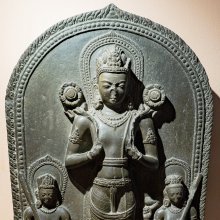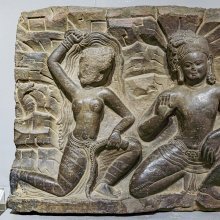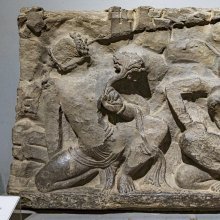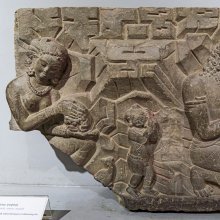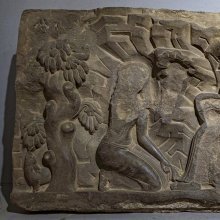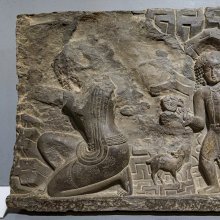Tol, Tôl, Ṭoḷ, Toḷ, Tōḻ: 5 definitions
Introduction:
Tol means something in the history of ancient India, Hindi, biology, Tamil. If you want to know the exact meaning, history, etymology or English translation of this term then check out the descriptions on this page. Add your comment or reference to a book if you want to contribute to this summary article.
Ambiguity: Although Tol has separate glossary definitions below, it also represents an alternative spelling of the word Tola.
Images (photo gallery)
India history and geography
Source: academia.edu: Minor Chiefs and "Hero" in Ancient TamilakamTol (“old, archaic”—a term linked with the traditional history of the Tamils, tollōr) is a name related to the historical geography and rulers of ancient Tamil Nadu, occuring in Sangam literature such as the Akanāṉūṟu and the Puṟanāṉūṟu.—Notes: (VIS 363, Rajarajan 2016: 11), cf. Tolkāppiyam.

The history of India traces the identification of countries, villages, towns and other regions of India, as well as mythology, zoology, royal dynasties, rulers, tribes, local festivities and traditions and regional languages. Ancient India enjoyed religious freedom and encourages the path of Dharma, a concept common to Buddhism, Hinduism, and Jainism.
Biology (plants and animals)
Source: Google Books: CRC World Dictionary (Regional names)1) Tol in Cameroon is the name of a plant defined with Ficus mucuso in various botanical sources. This page contains potential references in Ayurveda, modern medicine, and other folk traditions or local practices It has the synonym Ficus corylifolia Warb. var. glabrescens Warb. (among others).
2) Tol in Gabon is also identified with Ficus lutea It has the synonym Urostigma vogelii Miq. (etc.).
Example references for further research on medicinal uses or toxicity (see latin names for full list):
· Enumeratio Plantarum (1805)
· London Journal of Botany (1847)
· Flora of Mauritius and the Seychelles (1877)
· Annales Museum Botanicum Lugduno-Batavi (1867)
· Botanische Jahrbücher für Systematik, Pflanzengeschichte und Pflanzengeographie (1911)
· Bulletin de la Société Botanique de Belgique (1913)
If you are looking for specific details regarding Tol, for example pregnancy safety, chemical composition, diet and recipes, extract dosage, health benefits, side effects, have a look at these references.

This sections includes definitions from the five kingdoms of living things: Animals, Plants, Fungi, Protists and Monera. It will include both the official binomial nomenclature (scientific names usually in Latin) as well as regional spellings and variants.
Languages of India and abroad
Hindi dictionary
Source: DDSA: A practical Hindi-English dictionaryTol in Hindi refers in English to:—(nm) a band, batch; group; —[banana] to form a group..—tol (टोल) is alternatively transliterated as Ṭola.
...
Kannada-English dictionary
Source: Alar: Kannada-English corpusṬōl (ಟೋಲ್):—[noun] a school where traditional scriptures are taught.
--- OR ---
Tōl (ತೋಲ್):—[noun] = ತೋಲು [tolu]1.
--- OR ---
Tōl (ತೋಲ್):—[noun] (collectively) the young leaves of a plant.
--- OR ---
Tōl (ತೋಲ್):—[noun] = ತೋಲು [tolu]2.
--- OR ---
Tōḷ (ತೋಳ್):—[noun] = ತೋಳು [tolu].
Kannada is a Dravidian language (as opposed to the Indo-European language family) mainly spoken in the southwestern region of India.
Tamil dictionary
Source: DDSA: University of Madras: Tamil LexiconṬoḷ (டொள்) noun < Dutch dol. Belaying pin; கப்பற்கயிறுமாட்டும் முளை. [kapparkayirumattum mulai.] Nautical usage
--- OR ---
Ṭōl (டோல்) noun < Hindustain ḍhōl. [Telugu: ḍōlu.]
1. A large drum; ஒருவகை வாத்தியம். கூறுசங்கு டோன்முரசு [oruvagai vathiyam. kurusangu donmurasu] (தனிப்பாடற்றிரட்டு [thanippadarrirattu] i, 270, 1).
2. Clever talk; சாமர்த்தியப்பேச்சு. உன்னுடைய டோல் இங்கே செல்லாது. [samarthiyappechu. unnudaiya dol inge sellathu.] Local usage
--- OR ---
Ṭōl (டோல்) noun < dōlā. Swinging cot; தூங்குமஞ்சம். [thungumancham.] Local usage
--- OR ---
Tol (தொல்) adjectival [Telugu: toli.]
1. Old, ancient; பழமொழிைய. [pazhaiya.]
2. Natural; இயற்கையான. தொல்லெழில் [iyarkaiyana. thollezhil] (கலித்தொகை [kalithogai] 17, 5).
--- OR ---
Toḷ (தொள்) [toḷ(ḷu)tal [toṭṭal]] 9 transitive verb To perforate, bore with an instrument; துளைத்தல். (திவா.) செந்தீத் தொட்ட கருந்துளைக் குழலின் [thulaithal. (thiva.) senthith thotta karunthulaig kuzhalin] (பத்துப்பாட்டு: பெரும்பாணாற்றுப்படை [pathuppattu: perumbanarruppadai] 179). — intransitive To become weak, infirm; நெகிழ்தல். [negizhthal.] (W.)
--- OR ---
Tōl (தோல்) [tōltal [tōṟṟal]] 10 verb cf. dōla. [K. sōl, M. tōlka.] intransitive
1. To be defeated, discomfited, vanquished, as in battle, game, dispute, etc.; அபசயப்படுதல். தோற்பதறியார் [apasayappaduthal. thorpathariyar] (நாலடியார் [naladiyar], 313).
2. To fail in comparison; ஒப்பிற்றாழ்தல். பரவலருங்கொடைக்கு . . . நெடும்பண்பு தோற்ற . . . கற்பகமும் [oppirrazhthal. paravalarungodaikku . . . nedumbanpu thorra . . . karpagamum] (கம்பராமாயணம் சடாயுகாண். [kambaramayanam sadayugan.] 21).
3. To yield, flinch, give way voluntarily; இணங்குதல். [inanguthal.] (W.) — transitive To lose; இழத்தல். தோற்றோமடநெஞ்ச மெம்பெருமான் நாரணற்கு [izhathal. thorromadanencha memberuman naranarku] (நாலாயிர திவ்யப்பிரபந்தம் திருவாய்மொழி [nalayira thivyappirapandam thiruvaymozhi] 2, 1, 7).
--- OR ---
Tōl (தோல்) noun < தோல்-. [thol-.] [K. sōla.]
1. Defeat, discomfiture; தோல்வி. (பிங்கலகண்டு) [tholvi. (pingalagandu)]
2. Misfortune, ill-luck, loss; துரதிருஷ்டம். [thurathirushdam.] (W.)
--- OR ---
Tōl (தோல்) noun [Malayalam: tōl.]
1. [Telugu: tōlu, K. tōl.] Skin, leather, hide; சருமம். தோற்பையு ணின்று [sarumam. thorpaiyu ninru] (நாலடியார் [naladiyar], 26).
2. Bark, rind, peel, scales or coats of onion and other bulbous roots; புறணி. தோலிருக்கச் சுளைவிழுங்கி (பழமொழி). [purani. tholirukkas sulaivizhungi (pazhamozhi).]
3. Pod, husk of seeds; விதையின் மேற்றோல். [vithaiyin merrol.]
4. Body; உடம்பு. [udambu.] (திருக்குறள் [thirukkural], 1043, உரை. [urai.])
5. Leathern buckler, shield; தோலினாலியன்ற கேடகம். தோலின் பெருக்கமும் [tholinaliyanra kedagam. tholin perukkamum] (தொல். பொ. [thol. po.] 67).
6. Bellows; துருத்தி. மென்றோன் மிதியுலைக் கொல்லன் [thuruthi. menron mithiyulaig kollan] (பத்துப்பாட்டு: பெரும்பாணாற்றுப்படை [pathuppattu: perumbanarruppadai] 206).
7. Saddle; பக்கரை. தோறுமிபு வைந்நுனைப் பகழி மூழ்கலின் [pakkarai. thorumipu vainnunaip pagazhi muzhkalin] (பத்துப்பாட்டு: முல்லைப்பாட்டு [pathuppattu: mullaippattu] 72).
8. Bamboo; மூங்கில். (வைத்திய மலையகராதி) [mungil. (vaithiya malaiyagarathi)]
--- OR ---
Tōl (தோல்) noun < தொன்-மை. [thon-mai.]
1. (Pros.) Poem narrating an ancient story and inculcating the puruṣārthas in a felicitous diction; பழமொழிைய தொருபொருண்மேல் மெல்லென்ற சொல்லான் அறம் பொருளின்பம் வீடு என்ற விழுமியபொருள் பயப்பச் செய்யப்படும் நூல். [pazhaiya thoruporunmel mellenra sollan aram porulinpam vidu enra vizhumiyaporul payappas seyyappadum nul.] (தொல். பொ. [thol. po.] 551.)
2. Beauty; அழகு. (பிங்கலகண்டு) [azhagu. (pingalagandu)]
3. Elephant; யானை. புரைத்தோல் வரைப்பின் [yanai. puraithol varaippin] (பத்துப்பாட்டு: மலை [pathuppattu: malai] 88).
4. Fame; புகழ். தொல் வரவுந் தோலுங் கெடுக்கும் [pugazh. thol varavun tholung kedukkum] (திருக்குறள் [thirukkural], 1043).
5. Speech, utterance; வார்த்தை. (சூடாமணிநிகண்டு) [varthai. (sudamaninigandu)]
--- OR ---
Tōḻ (தோழ்) noun < தொழு. [thozhu.] Cattle-stall; பசுக் கொட்டில். ஊழிதொ றாவுந் தோழும்போன்று [pasug kottil. uzhitho ravun thozhumbonru] (சீவகசிந்தாமணி [sivagasindamani] 487).
--- OR ---
Tōḷ (தோள்) [tōḷ(ḷu)tal] 9 transitive verb < தொள்-. [thol-.] [K. tōḍu.]
1. To perforate, bore through; துளைத்தல். கேள்வியாற் றோட்கப்படாத செவி [thulaithal. kelviyar rodkappadatha sevi] (திருக்குறள் [thirukkural], 418).
2. To dig out, scoop; தோண்டுதல். தோ ணீர்க்கடலுள் [thonduthal. tho nirkkadalul] (சீவகசிந்தாமணி [sivagasindamani] 2697). தெவ்வேந்த ருடறோட்ட நெடுவேலாய் . . . கடறோட்டாரெனின் [thevventha rudarotta neduvelay . . . kadarottarenin] (கம்பராமாயணம் குலமுறை. [kambaramayanam kulamurai.] 8).
3. To remove; நீக்குதல். கடிதோட்ட களவகத்தே [nikkuthal. kadithotta kalavagathe] (திருக்கோவையார் [thirukkovaiyar] 8).
--- OR ---
Tōḷ (தோள்) noun < தோள்-. [thol-.] Hole, perforation; தொளை. (அகராதி நிகண்டு) [tholai. (agarathi nigandu)]
--- OR ---
Tōḷ (தோள்) noun < dōs. [Kanarese, Malayalam: tōḷ, Travancore usage tōḷu.]
1. Shoulder; புயம். சிலைநவி லெறுழ்த்தோ ளோச்சி [puyam. silainavi leruzhtho lochi] (பத்துப்பாட்டு: பெரும்பாணாற்றுப்படை [pathuppattu: perumbanarruppadai] 145).
2. Arm; கை. தோளுற் றொர் தெய்வந் துணையாய் [kai. tholur ror theyvan thunaiyay] (சீவகசிந்தாமணி [sivagasindamani] 10).
Tamil is an ancient language of India from the Dravidian family spoken by roughly 250 million people mainly in southern India and Sri Lanka.
See also (Relevant definitions)
Starts with (+286): Tol angur, Tol-atiparavi, Tol-kappiyatevar, Tol-melerutal, Tol-noykaram, Tol-vinaimakkal, Tola, Tola wood, Tola-molitevar, Tolabandi, Tolabhairava, Tolaca, Tolace, Tolaci, Toladara, Toladari, Tolage, Tolagike, Tolagisu, Tolagu.
Ends with (+44): Atol, Aviraittol, Avirantol, Avuriver-t-tol, Ayila-t-tol, Banpotol, Botol, Cakatol, Cautol, Cavutol, Colorin patol, Etetol, Etol, Gasha-gasha-tol, Goltol, I-eccatol, Iccattol, Ilavankattol, Ilinkapputol, Ilinkaputol.
Full-text (+1400): Dhol, Dol, Dhola, Tolvinainar, Tolattam, Tolviyati, Varittol, Tollelil, Patan-ittatol, Marttol, Mittol, Tirukkaittol, Vattattol, Tolvai, Tolkappiyam, I-eccatol, Tolkottu, Paccaittol, Tol angur, Gasha-gasha-tol.
Relevant text
Search found 22 books and stories containing Tol, Daol, Dhol, Dhozh, Dol, Dozh, Thaol, Thaozh, Thol, Thozh, Ṭōl, Tōl, Tōḷ, Tôl, Ṭoḷ, Toḷ, Tōḻ; (plurals include: Tols, Daols, Dhols, Dhozhs, Dols, Dozhs, Thaols, Thaozhs, Thols, Thozhs, Ṭōls, Tōls, Tōḷs, Tôls, Ṭoḷs, Toḷs, Tōḻs). You can also click to the full overview containing English textual excerpts. Below are direct links for the most relevant articles:
Formal Education System in Ancient India (by Sushmita Nath)
The Chatuspathi (Catuṣpāṭhī Tol) type of School < [Chapter 3 - Centres of Learning in Vedic and Buddhist Period]
Centres of learning in Vedic and Buddhist Period (Introduction) < [Chapter 3 - Centres of Learning in Vedic and Buddhist Period]
Puppetry in Assam (by Gitali Saikia)
Folk Theatre (a): Kamrupia Dhulia < [Chapter 6]
Musical instruments used in puppetry < [Chapter 4]
Characteristics of Folk drama < [Chapter 1]
Tiruvaymoli (Thiruvaimozhi): English translation (by S. Satyamurthi Ayyangar)
Pasuram 6.10.9 < [Section 10 - Tenth Tiruvaymoli (Ulakam unta Peruvaya)]
Pasuram 5.8.7 < [Section 8 - Eighth Tiruvaymoli (Ara-amute)]
Pasuram 6.6.10 < [Section 6 - Sixth Tiruvaymoli (Malukku, vaiyam alanta)]
The Religion and Philosophy of Tevaram (Thevaram) (by M. A. Dorai Rangaswamy)
Symbology of wearing skins in Shaivism < [Volume 2 - Nampi Arurar and Mythology]
Nayanar 12: Manakanchara (Manakkancarar) < [Volume 4.1.1 - A comparative study of the Shaivite saints the Thiruthondathogai]
Nayanar 50: Ninra Seer Nedumaara (Ninracir Netumara) < [Volume 4.1.1 - A comparative study of the Shaivite saints the Thiruthondathogai]
Blue Annals (deb-ther sngon-po) (by George N. Roerich)
Chapter 2 - The Chapter on Potowa (po to ba) < [Book 5 - The Sovereign Lord (Atiśa)]
Chapter 3 - Tranmission in Tibet < [Book 10 - The Kālacakra]
Chapter 6 - First incarnation series (ii): sangs rgyas ras chen < [Book 8 - The famous Dakpo Kagyü (traditions)]
Vishnudharmottara Purana (Art and Architecture) (by Bhagyashree Sarma)
3. The Viṣṇudharmottarapurāṇa and Modern Music < [Chapter 6 - Modern Relevance of Different Art Forms and Architecture]
